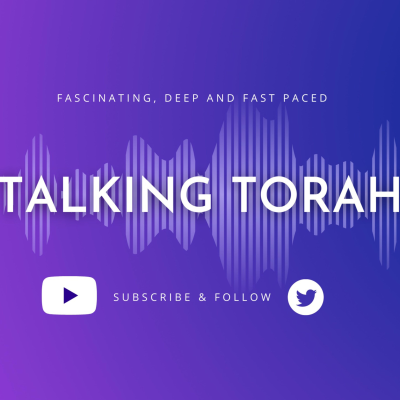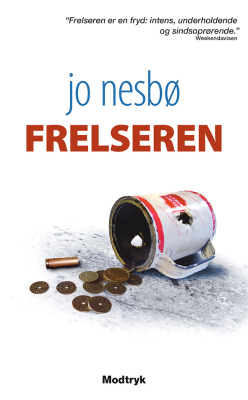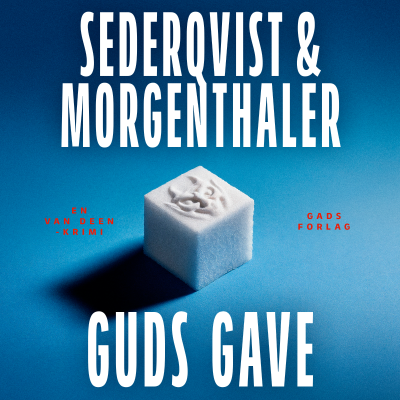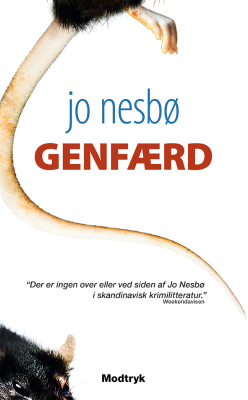
Talking Torah
engelsk
Historie & religion
Begrænset tilbud
2 måneder kun 19 kr.
Derefter 99 kr. / månedOpsig når som helst.
- 20 lydbogstimer pr. måned
- Podcasts kun på Podimo
- Gratis podcasts
Læs mere Talking Torah
Short clips, deep conversation, fast pace, different topics, all about discussing Torah.
Alle episoder
146 episoderParashat Kedoshim: Respecting elders is fearing God??
In this week's discussion, we explored the commandment to respect the elderly. The Torah emphasizes this by first instructing to rise in their presence and then to honor them. Additionally, it concludes the verse with "and you shall fear God, I am God." The obvious and first question is - why the repetition - why double this commandment? But besides that, looking at the verse, you also have to ask - why the seemingly unrelated statement? Why end the verse with that statement? Interestingly, we encounter this phrase of "and you shall fear God, I am God" again in our Parsha, particularly in the commandment against cursing a deaf person or obstructing a blind person. There too we find a double commandment, but unlike by us, there the additional statement at the end of the verse of "you shall fear God" actually makes sense - which increases the question by us - so what is it doing by us?? Join us as we delve into the significance of this directive and its broader implications, and on top of it - its relevancy for us today! 🔴 Make sure to subscribe here - https://bit.ly/TalkingTorahSubscribe [https://www.youtube.com/redirect?event=video_description&redir_token=QUFFLUhqbXpLclFNSmdCendlOWdaT2JSeFJYRHVCVF9JQXxBQ3Jtc0trVHFZcE01cU5NYTRxcjRYdEVHam5rN0JYYW5yTmxCM2llR3hQM3NkTFdqS3VqRWw1dDN4OWVIaFFSS0l5Y2JsSi0yaEZ4S1diMWVjdVdYYVpfTURhdm9iMk1qRGhfWVZaUDVIUW5EY1dyeWg5UWJWbw&q=https%3A%2F%2Fbit.ly%2FTalkingTorahSubscribe&v=FgHeTUOMJeg] 👉 Follow us on Twitter -  / talking_torah ✅ Follow and share the Talk on Facebook - https://bit.ly/TalkingTorahFacebookPage [https://www.youtube.com/redirect?event=video_description&redir_token=QUFFLUhqbk1zTTluQkxZWG45QkxNcHVCSkVTZFk5a2x6d3xBQ3Jtc0tuLWRjYUw3b2Niek5pMkx5SUNzQ3JhWC1rNVFHSnQ0VldoVXR3aEVIaUdRNkoxUDNuRWhVZlpYY25FNURpWWp3d0MyWnVXSDlNV3Zwbmh1MTVxMThKWkg3TjEwWVc0ZXBlUzRQWUs5Z1VkanpIckFCSQ&q=https%3A%2F%2Fbit.ly%2FTalkingTorahFacebookPage&v=FgHeTUOMJeg] 🎧 Listen to the Talk on Spotify - http://bit.ly/talkingtorah [https://www.youtube.com/redirect?event=video_description&redir_token=QUFFLUhqbVBZM3hvZE82bF9XTTE5SmoyNmE0ZUVHVnBnQXxBQ3Jtc0tsQnRQZ1JQYkt2SVhtel9uTnVMQkFlbjhCU1g1aG95emhnc0o4aGlzNUVMZ0dpY3RpMERreUZUVTVGOVpTbk1EYXZYSk5pYzRJTHByR3ZQZVhZNk1JaTVfUXRHX0RVSERhem5RajRBV0stLXdNZUEzSQ&q=http%3A%2F%2Fbit.ly%2Ftalkingtorah&v=FgHeTUOMJeg] 🍏 Listen on Apple Podcast - https://apple.co/3cgrzno [https://www.youtube.com/redirect?event=video_description&redir_token=QUFFLUhqa2p1bE9vbkgyU3pLNElxLWNvTzNTZVRoX1FIZ3xBQ3Jtc0ttSzNsb0U0ZzBRY0VPN2tUbmJPcVpZQnVGY2tUZzV4TUdZX3U4aW0zLXREZkkwWjFpbGUtZmZQbFJRRER2QkJZbjBoNlpNYUpmc3ZENmt1TmFYUWdRUncwaFJsXzhUOTltX3QzQnZ4cEJCWjU2WWVLOA&q=https%3A%2F%2Fapple.co%2F3cgrzno&v=FgHeTUOMJeg] ➡️ Tuvia and Yitzi talk Parsha ספר ויקרא פרשת קדושים #bible #Torah
Parashat Tazriah: Why can she choose??
This week's Parsha delves into the intricacies of a mother's obligation to bring a sacrifice after childbirth. What sets this commandment apart is the Torah's provision for two distinct options: a lamb or a bird. Interestingly, the choice depends on the mother's financial capacity. If she can afford it, a lamb is preferred, but if not, a bird suffices. This principle of offering different animals based on wealth recurs in various other contexts within Jewish law. The question arises: Why does the Torah present this commandment in such a nuanced manner? Typically, biblical commandments are straightforward—"do X"—without accounting for personal circumstances. Yet here, the Torah introduces flexibility, suggesting "ideally X, but if not, then Y." This approach prompts us to explore deeper meanings behind this commandment, the reasoning behind this sacrifice brought by the new mother - and important lessons for us today. 🔴 Make sure to subscribe here - https://bit.ly/TalkingTorahSubscribe 👉 Follow us on Twitter -  / talking_torah ✅ Follow and share the Talk on Facebook - https://bit.ly/TalkingTorahFacebookPage 🎧 Listen to the Talk on Spotify - http://bit.ly/talkingtorah 🍏 Listen on Apple Podcast - https://apple.co/3cgrzno ➡️ Tuvia and Yitzi talk Parsha ספר ויקרא פרשת תזריע
Parashat Shemini: why can’t they mourn?? (Talking Parsha - Shemini)
After months of meticulous work on the Mishkan, inauguration day arrives in this week's Parsha. However, amidst the jubilation, great tragedy strikes as fire descends from the sky, claiming the lives of Nadav and Avihu. In the aftermath, Moshe issues a startling command to Aharon, Elazar, and Itamar: they are forbidden to mourn. These commands raise several thought-provoking questions, on top of all - how are they expected to suppress their natural human emotions and refrain from mourning the deaths of their beloved family members? Moreover, why does this situation differ from the customary practices observed by Kohanim that should mourn the loss of one of their “7 close relatives”?? Delving deeper into this command, we uncover profound insights relevant to our contemporary challenges and what our nation has been facing the past 6 months. 🔴 Make sure to subscribe here - https://bit.ly/TalkingTorahSubscribe [https://www.youtube.com/redirect?event=video_description&redir_token=QUFFLUhqblVOY1Y1RnJXR21tVkI4LUFYVWYxU2hBVmxxZ3xBQ3Jtc0tsc2Z1TjRlcU9jSEcycktSVkY0emp2enYtdVhsa0p6VkhOYnByZmRpYm9helE3eHVwalFHMGFTQktuelZ4QlBpTWE1clZiZFJIVC1QeXVTWUpWbk9hYXh5S0kwbDl1SW1MLTRkbzBrWU4xYkR6VkJyVQ&q=https%3A%2F%2Fbit.ly%2FTalkingTorahSubscribe&v=x17E_X1JnGo] 👉 Follow us on Twitter -  / talking_torah ✅ Follow and share the Talk on Facebook - https://bit.ly/TalkingTorahFacebookPage [https://www.youtube.com/redirect?event=video_description&redir_token=QUFFLUhqbUxfcU5oLVlPaDhiOWdVd3lDblZyYkhONzNQZ3xBQ3Jtc0tsZERwaVVvTlJ1QXFHVHpjcmpHelZmYXgteHlaMG1vQ3loYzZLQ3NrelZtRlczdXhSbDBsTkZnTUU4RVV1OU44S0dvandfVnVzbm5qdnoxaWN6TUt4ejBVc2diamI1MzVJUmRkTS1VTUloTDR1WVZ0QQ&q=https%3A%2F%2Fbit.ly%2FTalkingTorahFacebookPage&v=x17E_X1JnGo] 🎧 Listen to the Talk on Spotify - http://bit.ly/talkingtorah [https://www.youtube.com/redirect?event=video_description&redir_token=QUFFLUhqbGx5eTlzcEVXakNLbDBuc3hvVXV1VC1wRE52Z3xBQ3Jtc0tsWEk5c3V4N2VjOUlPbzVybElfQVlHWDVmOGRrcjZaZkY5bURsaDNkX3V6SG1fdENjR2J4NWQyWnZxc0dqNUpHMVJRVXlfZzFOamV1dW9UZDJIRGNsbUVmT0ZPcnRIS1huVVlpN2RTY3NsYUU0YmpzTQ&q=http%3A%2F%2Fbit.ly%2Ftalkingtorah&v=x17E_X1JnGo] 🍏 Listen on Apple Podcast - https://apple.co/3cgrzno [https://www.youtube.com/redirect?event=video_description&redir_token=QUFFLUhqbFVkN2F6ekg2aElNem5nUWxWSlF0V2cwV3RnUXxBQ3Jtc0ttam9WZ2o1anp4VW52ZnpJcXNrVF9xdW5KWEs4ZmYzLWt4ODB4LWxyNUhPYU5sYUlLSnBfMnJIV1pXSDRIZE1fWE43SjMxT3pPWTZ4c1RncWZsUm1BdVNLb1BFUG1UVkxTVGpyTVo2bU9JYzhHYjJ1VQ&q=https%3A%2F%2Fapple.co%2F3cgrzno&v=x17E_X1JnGo] ➡️ Tuvia and Yitzi talk Parsha ספר ויקרא פרשת שמיני
Parashat Pekudei: Why "Set up" the Mishkan?? (Talking Parsha - Pekudei)
As we conclude the book of Shemot and the construction of the Mishkan, Hashem instructs Moshe to set it up. A notable emphasis is placed on the verb "setting up" (קום) in the Torah. Why does the Torah underscore this action? Furthermore, why was it specifically Moshe tasked with this responsibility? Why not Bezalel who built all the Mishkan, or Aharon who was in charge of all the work in the Mishkan? Delving into these questions reveals deeper insights into the significance of the Mishkan's establishment and Moshe's role in its completion, and on top of that - incredible important lessons for us today. Join us as we explore these intriguing aspects of Torah wisdom. 🔴 Make sure to subscribe here - https://bit.ly/TalkingTorahSubscribe 👉 Follow us on Twitter - https://twitter.com/Talking_Torah ✅ Follow and share the Talk on Facebook - https://bit.ly/TalkingTorahFacebookPage 🎧 Listen to the Talk on Spotify - http://bit.ly/talkingtorah 🍏 Listen on Apple Podcast - https://apple.co/3cgrzno ➡️ Tuvia and Yitzi talk Parsha; Book of Exodus ספר שמות
Parashat Vayakhel: Why was Bezalel chosen?? (Talking Parsha - Vayakhel)
In this week's portion, Moshe appoints Bezalel Ben Uri to oversee the construction of the Mishkan. Interestingly, Moshe introduces Bezalel's selection by saying, "Look, I have called the name of Bezalel..." This raises intriguing questions: Where was Bezalel summoned, and why this particular phrasing? What does it mean "look" - what are Am Yisrael supposed to look at? What does it signify to "call the name" of Bezalel? Delving into these nuances, we uncover profound insights into individual purpose and our responsibilities in the world today. Join us as we explore these timeless lessons from the Torah. 🔴 Make sure to subscribe here - https://bit.ly/TalkingTorahSubscribe 👉 Follow us on Twitter - https://twitter.com/Talking_Torah ✅ Follow and share the Talk on Facebook - https://bit.ly/TalkingTorahFacebookPage 🎧 Listen to the Talk on Spotify - http://bit.ly/talkingtorah 🍏 Listen on Apple Podcast - https://apple.co/3cgrzno ➡️ Tuvia and Yitzi talk Parsha; Book of Exodus ספר שמות
Vælg dit abonnement
Begrænset tilbud
Premium
20 timers lydbøger
Podcasts kun på Podimo
Gratis podcasts
Opsig når som helst
2 måneder kun 19 kr.
Derefter 99 kr. / måned
Premium Plus
100 timers lydbøger
Podcasts kun på Podimo
Gratis podcasts
Opsig når som helst
Prøv gratis i 7 dage
Derefter 129 kr. / måned
2 måneder kun 19 kr. Derefter 99 kr. / måned. Opsig når som helst.















































